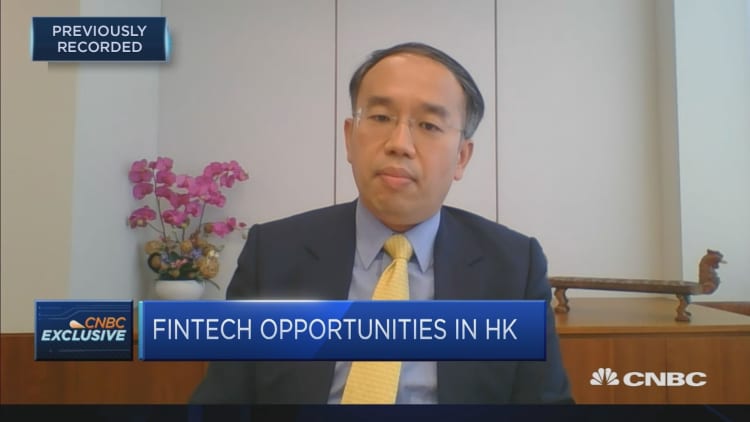
SINGAPORE — For Hong Kong's financial technology ecosystem to grow further, the city needs more measures in the areas of funding, talent and regulation, according to a top official from the Chinese city.
Compared to other technologies, fintech is the equivalent of a new industrial revolution and it can be potentially used as a lever to further push Hong Kong's position as a global financial center, said Christopher Hui, the secretary for financial services and the treasury on Monday.
"To me, there are three key elements for this (fintech) ecosystem to grow," he said on CNBC's "Street Signs Asia" during the Hong Kong FinTech Week.
"First of all, it is about money. Secondly, it's about talent and, thirdly, it's about regulation," Hui said. "So on these three fronts, in fact, we are considering what measures that we need to push forward so as to really grow our fintech ecosystem even further."
Hong Kong launched a $15.5 million wage subsidy plan in July to encourage companies in the financial sector to hire 1,000 fintech professionals over the next 12 months, the South China Morning Post reported. In exchange, the government will subsidize the salary of one full-time new hire with 10,000 Hong Kong dollars ($1,290) every month for a year, according to the newspaper.
The city's monetary authority has also issued eight licenses for virtual banks, allowing them to deliver retail banking services through the internet or other electronic channels.
The government is also attempting to play matchmaker to the city's financial services companies and fintech start-ups to speed up the adoption of relevant applications, according to Hui. On the governance side, he told CNBC that regulation has to be developed in a way that deals with risk and facilitates market development.
"Broadly speaking, you can see that the fintech ecosystem in Hong Kong is getting traction," he said, adding that it is happening against a backdrop where the coronavirus pandemic has accelerated people's desire and readiness to embrace financial technologies.
Cash is very rarely used in China, one of the world's biggest fintech market and home to some of the biggest fintech companies. One of them is Ant Group, which manages the massive digital payment service Alipay and is an affiliate of tech giant Alibaba.
Ant is set for a dual listing in Hong Kong and Shanghai this week. In fact, the company closed its Hong Kong institutional book building process early due to strong demand for its initial public offering.
Hui said Ant's listing, as well as those from other new economy companies, demonstrates Hong Kong's strength as an international financial center and its ability to draw upon capital from Chinese and international investors.


